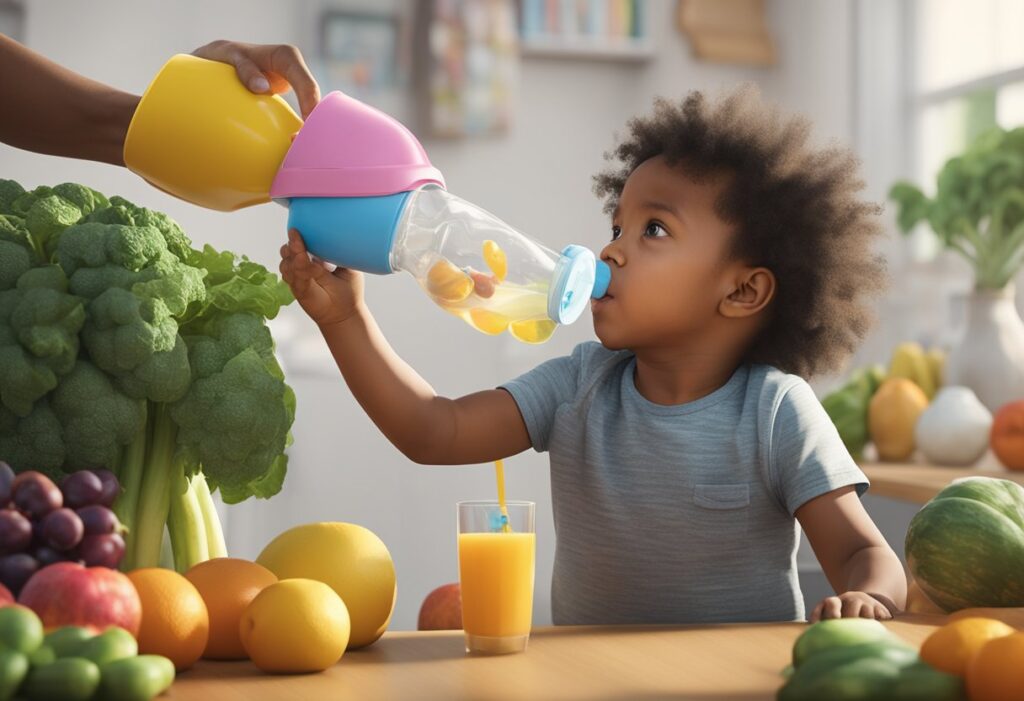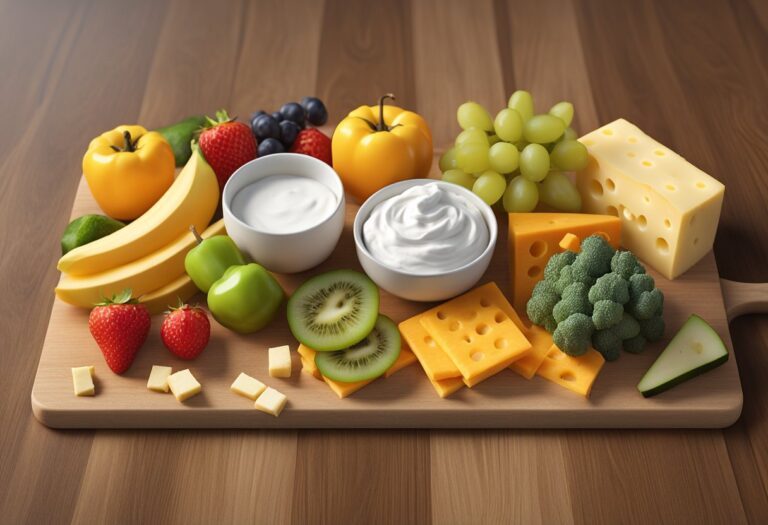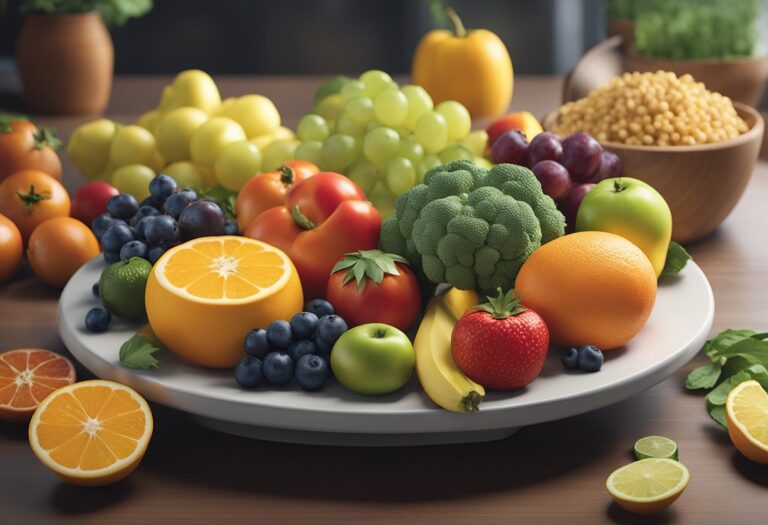Hydration for Toddlers: Tips for Healthy Drink Habits
Did you know that water makes up about 75% of a toddler’s body weight? That’s why hydration is crucial for their growth and development. Ensuring that toddlers have healthy drink habits not only promotes their overall well-being but also supports cognitive function, digestion, and immune system. In this article, we will explore the importance of hydration for toddlers and provide essential tips to help parents keep their little ones adequately hydrated.
Why Hydration is Important for Toddlers
Proper hydration is essential for the overall health and well-being of toddlers. It plays a crucial role in supporting their growth, development, and various bodily functions. Here are some key benefits of hydration for children:
- Optimal Physical Health: Adequate hydration ensures that a child’s body functions efficiently. It helps maintain a balanced temperature, promotes healthy blood circulation, and aids in the delivery of oxygen and nutrients to different cells and organs.
- Cognitive Function: Staying hydrated is essential for optimal brain function in toddlers. Sufficient hydration supports improved cognitive abilities, including focus, concentration, memory, and overall cognitive performance.
- Healthy Digestion: Water helps in the digestion and absorption of food, preventing constipation and promoting regular bowel movements in toddlers. It aids in the breakdown of nutrients and the removal of waste products from the body.
- Boosted Immune System: Adequate hydration is vital for maintaining a strong immune system in children. Water supports the production and circulation of white blood cells, which are responsible for fighting off infections and illnesses.
- Physical Performance: Hydration plays a crucial role in supporting physical activity and play in toddlers. Proper water intake helps prevent fatigue, muscle cramps, and dehydration during active periods, promoting endurance and performance.
“Ensuring toddlers stay hydrated is not just about quenching their thirst; it is about supporting their overall health, cognition, digestion, and immune system.”
Understanding the benefits of hydration for toddlers reinforces the importance of maintaining adequate water intake throughout the day. By prioritizing hydration, parents can help their children thrive and develop healthy habits as they grow.
How Much Water Should Toddlers Drink?

When it comes to ensuring adequate hydration for toddlers, parents often wonder how much water their little ones should be drinking. While there is no one-size-fits-all answer, general guidelines and recommendations can help parents understand the appropriate amount of water for their toddlers’ needs.
The amount of water a toddler should drink depends on various factors, including their age and weight. The American Academy of Pediatrics suggests the following daily water intake ranges:
| Age | Water Intake Range |
|---|---|
| 1-3 years | 4-5 cups (32-40 ounces) |
| 4-8 years | 5-7 cups (40-56 ounces) |
It’s important to note that these ranges include both water consumed directly and from other sources, such as fruits, vegetables, milk, and other drinks.
However, it’s essential to monitor your toddler’s individual needs and adjust their water intake accordingly. Factors like activity level, climate, and any underlying health conditions may require additional hydration. Toddler water intake should be spread throughout the day to ensure adequate hydration and prevent the risks of dehydration.
Factors to Consider for Determining Toddler Water Intake
- Age and weight: Younger toddlers may require less water than older ones. Adjust the amount based on your child’s age and weight.
- Activity level: Active toddlers who engage in play or physical activities may need more water to maintain hydration levels.
- Climate: Living in hot and humid climates can increase the need for additional water intake.
- Illness: When toddlers are sick, their body may require extra fluids to support recovery. Consult with a pediatrician to determine the appropriate amount.
“It’s crucial to monitor your toddler’s water intake and ensure they are staying hydrated throughout the day. Pay attention to their cues, such as thirst, and encourage regular sips of water to maintain optimal hydration.” – Dr. Lisa Johnson, Pediatrician
Remember that these are general guidelines, and individual differences may exist. Consult with your child’s pediatrician for personalized advice and recommendations on your toddler’s specific water intake needs.
Best Drinks for Hydrating Toddlers
When it comes to keeping toddlers hydrated, water should always be the go-to choice. It is the best drink for maintaining their fluid balance and promoting good overall health. The American Academy of Pediatrics recommends that children aged 1-3 years old consume 4-6 cups of water per day, alongside a healthy diet. Hydration is fundamental[best drinks for toddlers] for their growth and development, helping their bodies function optimally.
While water is essential, there are other suitable options to offer toddlers to keep them hydrated and satisfied. Milk, whether breast milk or formula, is an excellent choice as it provides essential nutrients, including protein and calcium, which support bone development. It is best to avoid offering cow’s milk as the primary source of hydration until after one year of age.
Diluted fruit juice can be introduced in small amounts, preferably 100% juice without added sugars. By diluting fruit juice with water, you can reduce the sugar content while still providing a flavorsome option. It’s important to remember that fruit juice should be limited to 4-6 ounces per day for children aged 1-3 years.
Herbal teas can also be a great choice for hydration. Non-caffeinated herbal teas, such as chamomile or peppermint, can be served warm or cold. These teas offer a variety of flavors and can be a soothing option for toddlers. However, it’s essential to ensure that the tea is appropriately diluted and free from any additives or sweeteners.
Here’s a breakdown of the best drinks for hydrating toddlers:
| Drink | Benefits | Recommended Amount |
|---|---|---|
| Water | Quenches thirst and supports overall health. | 4-6 cups per day |
| Milk | Provides essential nutrients for growth and development. | 2-3 cups per day |
| Diluted Fruit Juice | Offers a flavorsome option while limiting sugar intake. | 4-6 ounces per day |
| Herbal Teas | Soothing and flavorful alternative to water. | As desired, but appropriately diluted and free from additives. |
When introducing new drinks to toddlers, it’s important to monitor their preferences and ensure they are consuming a balanced and varied diet. Always consult with a pediatrician or healthcare provider for specific recommendations based on your child’s individual needs and circumstances.
Tips for Encouraging Toddlers to Drink More Water
Ensuring that toddlers stay adequately hydrated can sometimes be a challenge for parents. Toddlers may be fussy about drinking plain water and may prefer sugary or flavored drinks instead. However, it is crucial to establish healthy drink habits in toddlers to promote their overall well-being. Here are some practical tips and strategies to encourage toddlers to drink more water:
- Use Fun Cups or Bottles: Toddlers are often fascinated by bright colors and fun designs. Try using cups or bottles with their favorite characters or animals to make drinking water more enjoyable for them. Having a special cup or bottle that is exclusively for drinking water can pique their interest.
- Incorporate Flavored Water or Ice Cubes: If your toddler finds plain water boring, you can add a hint of flavor to make it more appealing. Infuse water with slices of citrus fruits or berries for a naturally refreshing taste. Alternatively, you can freeze small fruit pieces into ice cubes and add them to their water.
- Set Reminders: Toddlers can easily get distracted, so setting reminders at regular intervals can help them remember to drink water throughout the day. You can use alarms on your phone or create a visual schedule with pictures to indicate drinking water times.
- Make Hydrating Activities Fun: Turn drinking water into a fun and engaging activity for your toddler. You can create a chart where they can place stickers or draw a smiley face every time they finish a cup of water. Encourage them to have “water parties” with their toys or have a race to see who can finish their water first.
Remember, it is important to lead by example and show your toddler that drinking water is a regular part of your own daily routine. By implementing these tips and strategies, you can help your toddler develop healthy drink habits and stay hydrated for optimal growth and development.
Signs of Dehydration in Toddlers
It’s essential for parents to be aware of the signs of dehydration in toddlers to ensure their little ones stay properly hydrated. Dehydration occurs when the body loses more fluids than it takes in, which can lead to various health issues. By recognizing the telltale signs of dehydration, parents can take prompt action to address the problem and prevent potential complications.
Here are some common signs of dehydration in toddlers:
- Reduced urine output: One of the primary indicators of dehydration in toddlers is a decrease in urine frequency or quantity. If you notice that your child is producing significantly fewer wet diapers or has a dark-colored urine, it may be a sign of dehydration.
- Dry lips and mouth: Dehydration can cause the lips and mouth to become dry and parched. You may notice that your toddler’s lips appear cracked or that they are unusually thirsty.
- Lethargy: A dehydrated toddler may exhibit signs of tiredness or lack of energy. They may seem unusually sluggish, have reduced interest in activities or play, and appear drowsy.
- Irritability: Dehydration can affect mood and behavior in toddlers. They may become more irritable, fussy, or excessively cranky. Irritability can be a result of discomfort caused by dehydration.
If you suspect that your toddler is dehydrated, it’s crucial to seek medical attention promptly. A healthcare professional can assess the situation, provide appropriate guidance, and recommend necessary interventions, such as rehydration solutions or further medical evaluation.
Ensuring your toddler stays properly hydrated is vital for their overall well-being and development. By staying vigilant and recognizing the signs of dehydration, parents can support their child’s hydration needs and help them maintain optimal health.
Hydration Tips for Specific Situations
Ensuring proper hydration for toddlers is crucial, especially in specific situations that can increase the risk of dehydration. Whether it’s hot weather, illness, or physical activity, parents need to be mindful of their child’s water intake and take necessary steps to keep them hydrated. Here are some practical tips to help toddlers stay hydrated in different contexts:
Hot Weather
- Encourage your toddler to drink small sips of water frequently throughout the day, even if they don’t feel thirsty.
- Offer hydrating foods like watermelon, cucumber, and oranges to provide additional fluid intake.
- Dress your toddler in light, breathable clothing and keep them in shaded areas to prevent overheating.
During Illness
- If your toddler is experiencing diarrhea, vomiting, or fever, it’s important to replenish their fluids more frequently.
- Offer oral rehydration solutions recommended by your pediatrician to replace lost electrolytes.
- Encourage your toddler to drink clear fluids like water, diluted juice, or herbal tea to prevent dehydration.
During Physical Activity or Play
- Ensure your toddler drinks water before, during, and after physical activities to maintain hydration.
- Offer small, frequent water breaks to prevent excessive fluid loss and overheating.
- Consider providing electrolyte-rich drinks in moderation for prolonged or intense activities.
Remember, adjusting water intake based on the circumstances is crucial to keep your toddler adequately hydrated. These tips will help you ensure that your little one stays hydrated and healthy in various situations. By being proactive and attentive, you can protect your toddler from the risks of dehydration.
Establishing Healthy Hydration Habits for Toddlers
When it comes to toddlers, establishing healthy hydration habits is crucial for their overall well-being. Parents play a pivotal role in modeling good drinking habits, creating routines, and maintaining consistency in providing water and other hydrating options.
One effective strategy is to emphasize the importance of drinking water by making it readily available throughout the day. Keep a water bottle within your toddler’s reach and encourage them to take sips regularly. *Consistently* offering water during meal times and between activities helps establish hydration as a natural part of their daily routine.
“Drinking water and staying hydrated is a habit that we want our children to practice from an early age. By establishing routine and consistency, we can instill healthy hydration habits that will benefit them for life.” – Dr. Emily Thompson, Pediatrician
Introducing fun cups or bottles can also make the drinking experience more enjoyable for toddlers. Look for colorful designs or ones featuring their favorite characters. *Allowing* them to choose their own cup can create a sense of ownership and make them more willing to drink from it.
To address resistance to drinking water, consider offering flavored water by adding a slice of lemon, lime, or a few berries to enhance taste without added sugars. Frozen fruit ice cubes can also make water more enticing for toddlers. *Remember*, it’s important to avoid excessive sugar intake from flavored drinks.
It’s natural for toddlers to assert their independence and express their preferences. *Recognizing* this, involve them in grocery shopping and highlight the benefits of hydration when selecting beverages. Explain why water is the healthier choice and limit the availability of sugary drinks in the household.
Challenges and Solutions for Overcoming Resistance
Some toddlers may resist drinking water or prefer other beverages. Here are some common challenges and potential solutions:
- Preference for sweet drinks: Limit the availability of sugary drinks, gradually reducing their consumption. Encourage healthier alternatives such as flavored water or diluted fruit juice.
- Refusing to drink: Offer water at regular intervals, including before and after meals. Engage in water-related activities, such as playing with water toys, to make drinking more appealing.
- Transitioning from bottle to cup: Gradually introduce drinking from a cup, starting with small amounts of water. Reward and praise your toddler for successfully drinking from a cup.
By addressing these challenges and offering alternatives, parents can help their toddlers establish healthy hydration habits that will benefit them throughout their lives.
| Benefits of Establishing Healthy Hydration Habits in Toddlers | Solutions for Overcoming Resistance to Drinking Water |
|---|---|
| – Proper hydration supports brain development and cognitive function. | – Limit the availability of sugary drinks and gradually introduce healthier alternatives. |
| – Adequate hydration aids digestion and prevents constipation. | – Engage in water-related activities to make drinking more appealing. |
| – Drinking water helps maintain a strong immune system and prevents illnesses. | – Offer water at regular intervals, before and after meals. |
Conclusion
Hydration is of utmost importance for toddlers as it plays a significant role in their overall health and development. Ensuring that toddlers maintain healthy drink habits is crucial to support their cognitive function, digestion, and immune system. By following some simple tips and strategies, parents can ensure that their toddlers stay adequately hydrated throughout the day.
It is recommended that toddlers drink an appropriate amount of water based on their age and weight. While prioritizing water as the primary source of hydration, parents can also offer other suitable drinks such as milk, diluted fruit juice, or herbal teas. Encouraging toddlers to drink more water can be made fun by using colorful cups or bottles, adding flavored water or ice cubes, or incorporating hydrating activities.
Recognizing the signs of dehydration in toddlers is essential. Reduced urine output, dry lips and mouth, lethargy, and irritability are common symptoms. Parents should seek medical attention if dehydration is suspected. Additionally, specific situations such as hot weather, illness, or physical activity may require increased water intake for toddlers.
Establishing healthy hydration habits in toddlers requires consistency and good role modeling from parents. Creating routines, maintaining regular water availability, and addressing resistance to drinking water are key steps in cultivating long-term healthy drink habits. By implementing these strategies and understanding the importance of hydration, parents can ensure that their toddlers are on the path to maintaining optimal hydration and overall well-being.







